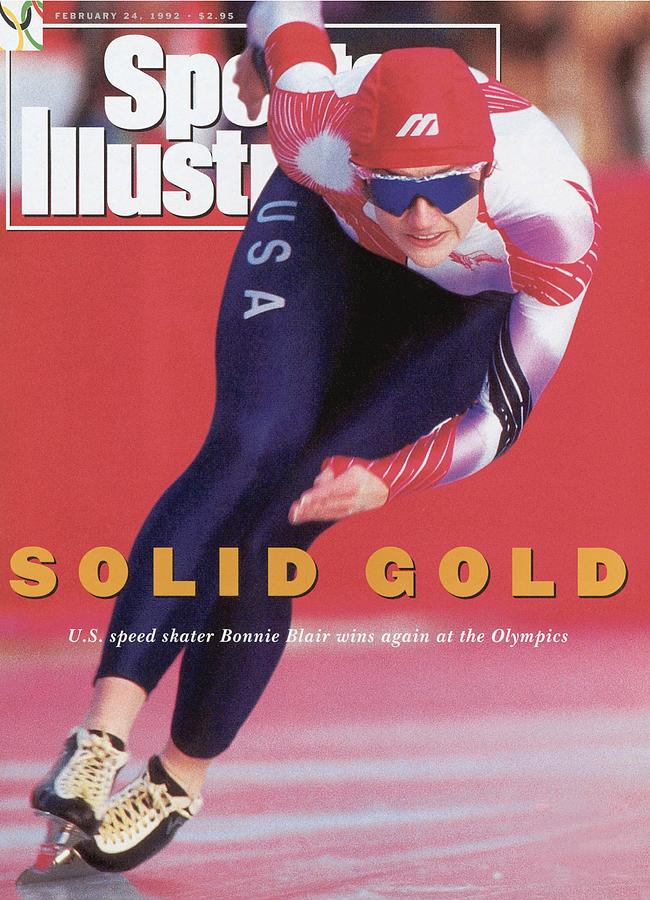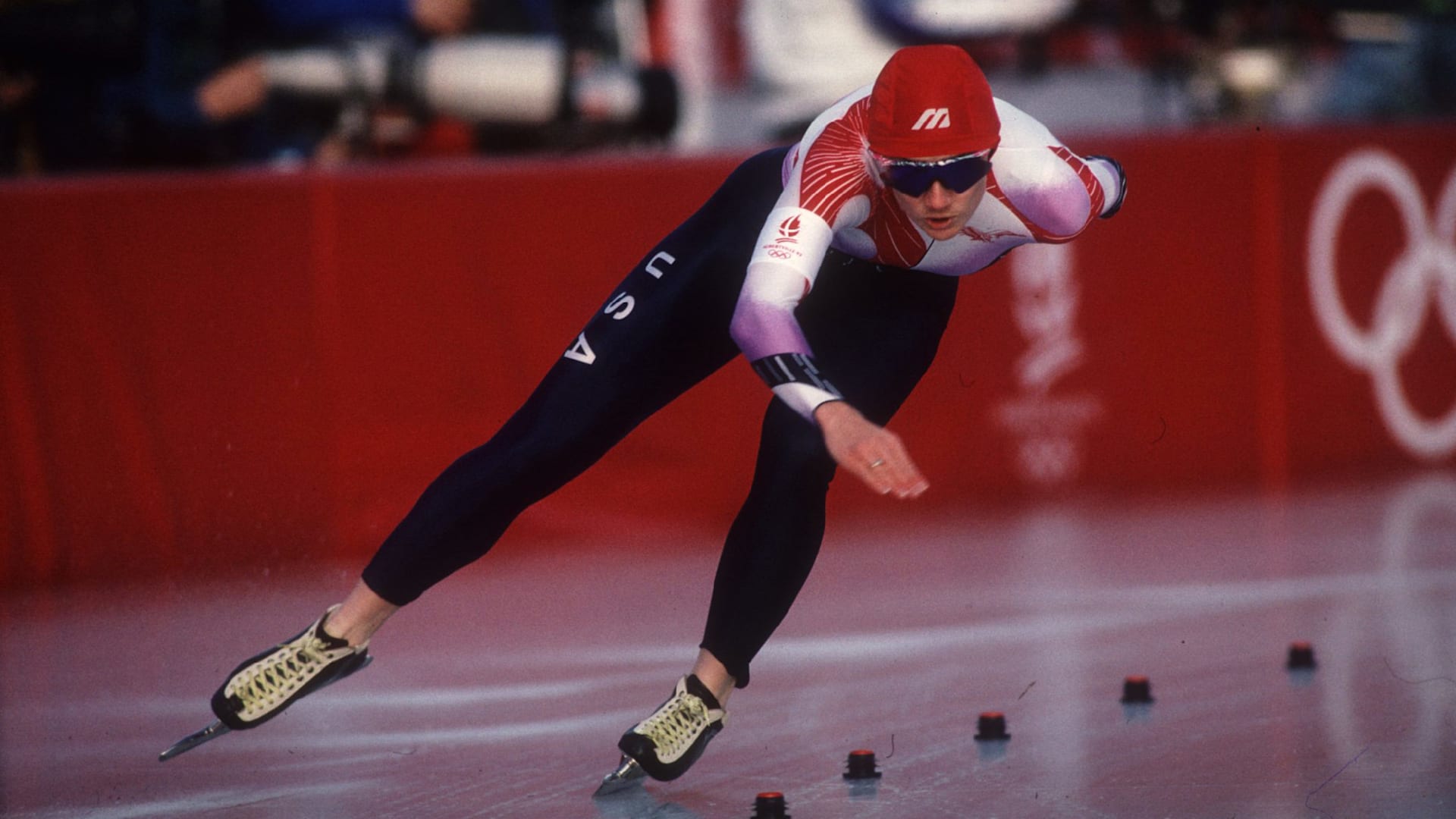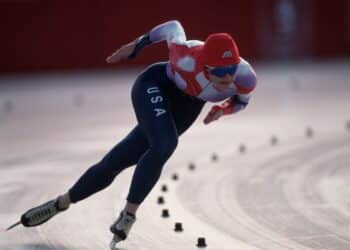By: Zachary Draves
She is the most decorated female US Winter Olympian of all time.
Giving family, friends, and throngs of fans plenty to cheer for, speed skating legend Bonnie Blair has a rightful place in Olympic history and her culminating moment came thirty years ago at the winter games in Albertville, France.
Prior to that, Bonnie had competed in Sarajevo in 1984 and in Calgary in 1988.
It was in Calgary that she took her first steps into Olympic greatness.
She won gold in the 500m and set a world record as well as a bronze in the 1000m.
(Courtesy: EuroSport)
As a result of her achievements, Bonnie had the honor of carrying the American flag during the closing ceremony.
It was evident at that time that Bonnie Blair had all the makings of an Olympic legend.
Then came Albertville.
Bonnie swept both the 500m and 1000m and became the first woman to win gold in the 500m consecutively.
Afterwards, she became a national sensation gracing the cover of Sports Illustrated and received endorsements through the sports marketing agency Advantage International.
(Courtesy: Sports Illustrated Covers)
She would go on to repeat that feat two years later in Lillehammer, Norway.
In the aftermath of the recent Olympic trials and in the buildup to the upcoming games in Beijing, I had the honor to speak to Bonnie and we discussed Albertville, her plans for the games, and her life today.

(Courtesy: IMDB)
Can you believe it has been 30 years since you competed in Albertville in 1992?
No because then it means it was like 34 years in Calgary and then 38 since Sarajevo, that’s crazy. I have got a daughter that is 21 and my son is 23 so yes it does make sense to a certain extent. There are a lot things that make it seem like it was yesterday and then there are times when I know that it was a while ago.
How different was it to be able to compete in Albertville then Calgary or Sarajevo and what was the atmosphere like?
I think a couple of things. Sarajevo was outside then Calgary was the first time we were inside for long track speed skating and then Albertville we were back outside again. At that point there wasn’t a ton of indoor facilities so we had a lot of competitions outside anyway and so we were to a certain extent use to it where for instance nowadays some of the athletes skating today never had to skate outside or had a competition outside. So it was the norm for us to be outside then inside. It was a little bit warmer there than they had anticipated and sometimes some of the races got postponed and because of how it was situated and the sun going over and getting the sun off the ice surface as the sun was setting, they had to postpone some of the races. One of mine was postponed and I’m guessing it was the 500 that was postponed for an hour and we didn’t know until we got there. I looked outside and heard my family was already in the stands and I hadn’t seen my family yet and so I said I am going to hop the fence and then go see my family. That was comforting to me because my family was all in town but I wouldn’t have seen them before the race had that not been postponed and so it was nice for me to be able to go see them and hug them. But then when I realized that they were kind of nervous I was like I got to get out of here so as I quick as I was there I left right away because I could see that they were nervous and not like I wasn’t but I didn’t need to add my nervousness to their nervousness. You are always going to have a certain amount of nerves before a race anyway and so I went back and hung out in the locker. That was what it was like to be outside and you just have to learn to adapt. I did end up winning that race and my family was on the backstretch and when they were presenting the medals you are facing the homestretch of the crowd and all I wanted to do was to keep turning around and waving to the other side because that is where my family was. I must have said something to somebody in the Olympic committee or TV because after I won the 1000 they did bring my brothers, sisters, and my mom right front and center where I could see them. The only faces that I could recognize after the 500 were Don Johnson and Melanie Griffith who came to watch and I actually got to meet them after. But you wanted that personal connection and your family is what you are looking for and so it was nice for my family to be front and center.
Speaking of family, I had been reading that your father had passed away a couple of years and these games carried a special meaning for you because you dedicated it to the memory of your father who I understand was very adamant about you becoming an Olympian.
Yeah I mean I don’t know if that is the exact terminology but you know I am the youngest and my earliest recollection of skating and competing was just how much fun it was to go to the rink and compete and all that. My dad was the one who took me to the rink all the time and he was the one with the stopwatch at the finish line for every meet that I was in. As much as I was dedicated he was just as dedicated as a dad and not that my mom wasn’t but my dad was the one who went to the rink at night while my mom would be at home and have dinner ready for us when we came back. At competitions, my mom was a judge and a judge in a speed staking was different than a judge in figure skating or gymnastics and she was a finish judge. It was pretty typical that parents volunteered for competitions and my dad was there for practices. I do specifically remember one time when I was in junior high and I was at my dad’s office and he was going to drive me home and the junior high wasn’t too far from where he worked. While I was there, he introduced me to this new co-worker of his and he said “this is my daughter Bonnie and she’s going to be in the Olympics.” I kind of was like “what is he talking about?” because back then I did just skate in short track or what we called pack style. So you could be on the bigger tack and have multiple people at the starting line at once and have heats and finals. I didn’t skate like they did in the Olympic style and at that time short track wasn’t in the Olympics. So as a kid you are thinking “Is my dad nuts?” “What’s he talking about?” but years later I remember that conversation and I was like well maybe dad knew something that I didn’t. My parents were never forceful of us kids being in the sport it was you were encouraged and supported and if you wanted to do it they were there for you and they were going to go with you and help you in anyway that they can. It was probably his dream first before it became mine but like I said years later did he have this premonition especially given that I didn’t skate the Olympic style and short track wasn’t in the Olympics at that time. It was a little bizarre set of circumstances and yet this little kid was able to internalize my dad’s dream and even take it beyond his wildest dreams for sure because it was beyond mine.
You do what you do in Albertville winning gold in the 500m and 1000m and then you become one of the most decorated Olympians and then you come home and get all this attention. What was it like to be able to accomplish all that and to be able to come home and get all that recognition?
Yeah especially when you are in a sport like ours where you are looked at once every four years. That is kind of overwhelming because it is not something that we were used to back in the day. You were not used to having that kind of notoriety. I appreciated the notoriety but I don’t think it was so overwhelming that I’m like oh my gosh I don’t like this because there were some perks to came with it to. You were able to go somewhere on someone else’s dime so there were perks that came with that. I looked at it like I am grateful and appreciated those things that came my way and yet I kind of feel and my family did as well to not let my head get too big because they would have come with that pin and popped it right away. You make sure you stay the same Bonnie Blair as always and to this day I feel that I have done that as best I can. There are times where you can get a perk or whatever and that is nice but I also appreciate those perks and thankful. That is one thing my mom instilled in me which is you write thank you notes for people that do stuff for you. That is something I have definitely passed on to my kids to make sure they do what’s right so when they get home and when they go to bed at night they can put their hand on their pillow knowing they did the right thing.
With the Olympics coming up in Beijing and we just had the trials in Milwaukee, what are you looking forward to?
Well first of all this is going to be my first winter games where I will not be at a winter games since I was in 1984. So that in it of itself will be different for me and I love that I have had the opportunity to go to the Olympics since I have been done but definitely understand that is not happening now. Not a lot of the media is going but we are lucky that the athletes are going so that’s one thing. I’m an Olympic junkie and even in the summer. I don’t even run to the grocery store to get food because I don’t want to miss anything. I don’t like knowing results before I watch them. That’s for sure going to be more of a challenge to figure out when they are actually racing and you have to get up in the middle of the night and try to watch a live feed somewhere especially in a different time zone. I’m wanting to know what Team USA in our sport is doing but in all the other sports as well. My son who plays for the University of Minnesota he’s got three of his teammates on the men’s teams. It will be different to navigate not being there in real time.
Thirty years after Albertville, what other things are you involved in and how would you want those games to be remembered?
My husband’s coaching a group of athletes that include my daughter for speed skating. I didn’t know if you saw but she tested positive for COVID and so she wasn’t able to compete in the trials. She didn’t have any symptoms and she didn’t feel sick. He coaches a group of skaters called DASH and I am kind of like his sidekick. I help coaching a little bit but it is more of his baby and I am helping out. We are really trying to build up DASH in the sense that we can try to get more skaters into speed skating. Yes we would like to get more skaters on the ice and even here at the Petitt Center we want to get more skaters in figure skating and hockey. Ultimately we want to build our sport back up to what it was. We do feel that we are lacking in numbers and a big feeder system since 1998 was when the sport of in lining started coming in and having that crossover. That is where we are getting our athletes from and it is not enough. My two sisters were just at the local rink in Champaign for a couple sessions and the speed skating coach saw them and said you should come to speed skate. Then they went back and told my mom and they happen to run into the guy at the grocery store. That is kind of how our family got into it. It is about maybe trying to pluck kids out of public sessions. Maybe some hockey kids that either aren’t going to the college ranks or there are great skaters but they have no hands. Being able to try to find more skaters and even getting them real little like myself. We would like to have a feeder program where you can have them when they are little rugrats to when they are at the international level, kind of like what they do with soccer in Europe. That’s our ultimate goal but it is stepping stones. We want to build around the nine athletes we have now and try to get more skaters into our sport.
For me, it was emotional to come away with two more gold medals. It was my first Olympics without my dad there. Dedicating those medals in his memory and there were about 45 members of the Blair bunch that were there and they all had a great time.
You can find more information about DASH at https://www.dashskating.org/


 NFL
NFL



